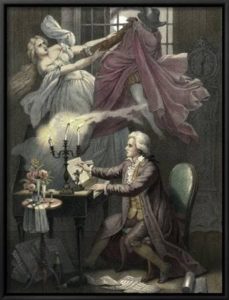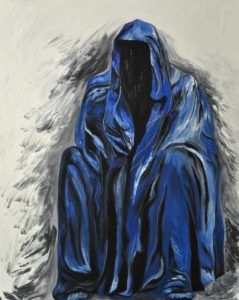Commissioned after the overwhelming success of his trip to Prague in January and February of 1787, Mozart’s Don Giovanni was originally to have been performed on October 14th of that same year. The occasion was an evening of musical entertainment for the Archduchess Maria  Theresa of Austria (niece of then Emperor Joseph II) while she was visiting Prague. The opera’s subject matter was strategically conceived by Mozart in consideration of the long history of Don Juan operas in Prague. The city lay something of a claim to the character, as the genre of operas featuring Don Juan as a central figure had originated in Prague during the 18th century.
Theresa of Austria (niece of then Emperor Joseph II) while she was visiting Prague. The opera’s subject matter was strategically conceived by Mozart in consideration of the long history of Don Juan operas in Prague. The city lay something of a claim to the character, as the genre of operas featuring Don Juan as a central figure had originated in Prague during the 18th century.
Don Giovanni’s libretto was written by Mozart’s previous librettist and collaborator Lorenzo Da Ponte. In fact, Da Ponte lifted much of his libretto from that written by Giovani Bertati for the opera Don Giovanni Tenorio, first performed in Venice early in 1787. Among the most important of elements that Da Ponte copied from the production was opening the show with the murder of the Commendatore. Earlier iterations of the classic drama had him bumped off somewhere in the middle of the production. Da Ponte’s libretto was not specific as to where the drama was unfolding, only a mysterious assertion that the action occurs within a “city in Spain”. But Da Ponte’s setting of the action was far from the only uncertainty that would plague this iconic opera’s debut…
The production itself was forced to undergo so many delays owing to the scattered mind of its composer. Only six months earlier Leopold Mozart had died, and the burden of his loss was still weighing enormously on Mozart. The melodies in his head simply would not align in their usual fashion, and this resulted in an opera that could not be prepared in time for the original performance date of October 14th. In its place, Mozart’s celebrated Marriage of Figaro was substituted by the Emperor himself, and because the musicians of the local theater were already well-acquainted with its music.
After a tense few weeks, Mozart emerged with the completed score on October 28th. Da Ponte was long gone by this point, having been recalled to Vienna to work on a different opera. History is not clear when the overture was completed, but all accounts agree it was last minute. Some reports tell of the overture being completed the day before the premiere, while others insist that it was finished the very day of the debut performance.
 Originally entitled “Il dissoluto punito ossia il Don Giovanni – Dramma giocoso in due atti” (The Rake punished, or Don Giovanni, a dramma giocoso in two acts), Don Giovanni brought the house down. Like so many other pieces of Mozart’s music, the Prague audiences were blown away by the complexity and raw power the production emanated. As the local newspaper Prager Oberpostamtzeitung reported, “Connoisseurs and musicians say that Prague has never heard the like,” and “the opera … is extremely difficult to perform.” Wising up to the game of Mozart classics debuting in Prague, the Viennese newspaper Provincialnachrichten managed to sneak one of their own into the debut performance, and they reported triumphantly that “Herr Mozart conducted in person and was welcomed joyously and jubilantly by the numerous gathering.”
Originally entitled “Il dissoluto punito ossia il Don Giovanni – Dramma giocoso in due atti” (The Rake punished, or Don Giovanni, a dramma giocoso in two acts), Don Giovanni brought the house down. Like so many other pieces of Mozart’s music, the Prague audiences were blown away by the complexity and raw power the production emanated. As the local newspaper Prager Oberpostamtzeitung reported, “Connoisseurs and musicians say that Prague has never heard the like,” and “the opera … is extremely difficult to perform.” Wising up to the game of Mozart classics debuting in Prague, the Viennese newspaper Provincialnachrichten managed to sneak one of their own into the debut performance, and they reported triumphantly that “Herr Mozart conducted in person and was welcomed joyously and jubilantly by the numerous gathering.”
Music historians have cited that Don Giovanni represented an significant tonal shift in Mozart’s musical stylings, one brought on no doubt by his father’s passing. Despite his grief, Mozart dug deep within himself to pull forth one of the most visceral and compelling operas that can be seen on the stage today. One only wonders how different the world of classical music might have been if Mozart had not found the stamina to power through that hectic and emotional two-week period before the curtains rose in Prague.